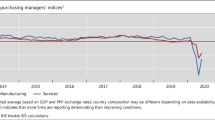Abstract
Between December 1994 and March 1999, Mexico, Thailand, Indonesia, Korea, Malaysia, Russia and Brazil experienced major financial crises, which were associated with massive recessions and extreme movements of exchange rates. Similar crises have threatened Turkey and Argentina (2000 and 2001) and most recently Brazil (again). This article discusses the reform of the international financial system with a focus on the role of the IMF—reforms directed at crisis prevention, and those intended to improve the responses to crises. The article concludes with an appraisal of what has been achieved, and what remains to be done to make the international financial system safer. JEL no. E5, E6, F3, F4, G1
Similar content being viewed by others
References
Ariyoshi, A., K. Habermeier, B. Laurens, I. Oetker-Robe, J. Canales-Kriljenko, and A. Kirilenko (2000). Capital Controls: Country Experiences with Their Use and Liberalization. IMF Occasional Paper, 190. International Monetary Fund, Washington, D.C.
Berg, A., E. Borensztein, G. Milesi-Ferretti, and C. Pattillo (1999). Anticipating Balance of Payments Crises: The Role of Early Warning Systems. IMF Working Paper 186. International Monetary Fund, Washington, D.C.
Bekaert, G., C. R. Harvey, and C. Lundblad (2002). Does Financial Liberalization Spur Growth? Paper presented at the World Bank Conference, Financial Globalization: A Blessing or a Curse? May 30–31, Washington, D.C. (http://www.worldbank.org/research/conferences/financial_globalization.htm)
Bhagwati, J. (1998). The Capital Myth: The Difference between Trade in Widgets and DollarsForeign Affairs 77 (3): 7–12.
Chari, A., and P. B. Henry (2002). Capital Account Liberalization: Allocative Efficiency or Animal Spirits? Paper presented at the World Bank Conference, Financial Globalization: A Blessing or a Curse? May 30–31, Washington, D.C. (http://www.worldbank.org/research/conferences/financial_globalization.htm)
Cushman, D. O., and T. Zha (1997). Identifying Monetary Policy in a Small Open Economy under Flexible Exchange Rates.Journal of Monetary Economics 39 (3): 433–448.
Dobson, W., and G. C. Hufbauer (with the assistance of H. K. Choo) (2001).World Capital Markets: A Challenge to the G-10. Washington, D.C.: Institute for International Economics.
De Gregorio, J., S. Edwards, and R. Valdés (2000). Controls on Capital Inflows: Do They Work?Journal of Development Economics 63 (1): 59–83.
Edwards, S. (1999). How Effective Are Capital Controls? NBER Working Paper 7413. National Bureau of Economic Research, Cambridge, Mass.
Eichengreen, B. (2000).Can the Moral Hazard Caused by IMF Bailouts Be Reduced? Geneva: International Center for Monetary and Banking Studies, and London: Centre for Economic Policy Research.
Eichengreen, B., and A. Mody (2000). Would Collective Action Clauses Raise Borrowing Costs? NBER Working Paper 7458. National Bureau of Economic Research, Cambridge, Mass.
Eichengreen, B., D. Mathieson, B. Chadha, A. Jansen, L. Kodres, and S. Sharma (1998). Hedge Funds and Financial Market Dynamics. IMF Occasional Paper 166. International Monetary Fund, Washington, D.C.
Eichengreen, B., M. Mussa, G. Dell'Ariccia, E. Detragiache, G. Milesi-Ferretti, and A. Tweedie (1999). Liberalizing Capital Movements: Some Analytical Issues. Economic Issues 17. International Monetary Fund, Washington, D.C.
Favero, C. A., and F. Giavazzi (2002). Why Are Brazil's Interest Rates So High? Mimeo. Innocenzo Gasparini Institute for Economic Research. Bocconi University, Milan. July.
Fischer, S. (1998). Capital Account Liberalization and the Role of the IMF. In S. Fischer et al., Should the IMF Pursue Capital-Account Convertibility? Princeton University Essays in International Finance 207. Princeton.
Fischer, S. (2001a). Exchange Rate Regimes: Is the Bipolar View Correct?Journal of Economic Perspectives 15 (2): 3–24.
Fischer, S. (2001b). The International Financial System: Crises and Reform.The Robbins Lectures. October 29. (http://www.iie.com/fischer/sl.html)
Galindo, A., A. Micco, and G. Ordoñez (2002). Financial Liberalization and Growth: Empirical Evidence. Paper presented at the World Bank Conference, Financial Globalization: A Blessing or a Curse? May 30–31, Washington, D.C. (http://www.worldbank.org/research/conferences/financial_globalization.htm)
Goldstein, M. (2002).Managed Floating Plus. Policy Analyses in International Economics 66. Washington, D.C.: Institute for International Economics.
Goldstein, M., G. L. Kaminsky, and C. M. Reinhart (2000).Assessing Financial Vulnerability: An Early Warning System for Emerging Markets. Washington, D.C.: Institute for International Economics.
Gourinchas, P., and O. Jeanne (2002). On the Benefits of Capital Account Liberalization for Emerging Economies. Paper presented at the World Bank Conference, Financial Globalization: A Blessing or a Curse? May 30–31, Washington, D.C. (http://www.worldbank.org/research/conferences/financial_globalization.htm)
IMF (2000). Debt and Reserve-Related Indicators of External Vulnerability. (http://www.imf.org/external/np/pdr/debtres/): March 23.
Ishii, S., I. Oetker-Robe, and L. Cui (2001). Measures to Limit the Offshore Use of Currencies: Pros and Cons. IMF Working Paper 01/43. International Monetary Fund, Washington, D.C.
Kaplan, E., and D. Rodrik (2001). Did the Malaysian Capital Controls Work? Mimeo. Harvard, Kennedy School of Government, Cambridge, Mass. (http://ksghome.harvard.edu/.drodrik.academic.ksg/Malaysia%20controls.PDF)
Reinhart, C. M., and I. Tokatlidis (2002). Before and After Financial Liberalization. Paper presented at the World Bank Conference, Financial Globalization: A Blessing or a Curse? May 30–31, Washington, D.C. (http://www.worldbank.org/research/conferences/financial_globalization.htm)
Williamson, J. (1990). What Washington Means by Policy Reform. In J. Williamson (ed.),Latin American Adjustment: How Much Has Happened? Washington, D.C.: Institute for International Economics.
Williamson, J. (2000).Exchange Rate Regimes for Emerging Markets: Reviving the Intermediate Option. Policy Analyses in International Economics 60. Washington, D.C.: Institute for International Economics.
Author information
Authors and Affiliations
Corresponding author
About this article
Cite this article
Fischer, S. Financial crises and reform of the international financial system. Rev. World Econ. 139, 1–37 (2003). https://doi.org/10.1007/BF02659606
Issue Date:
DOI: https://doi.org/10.1007/BF02659606




